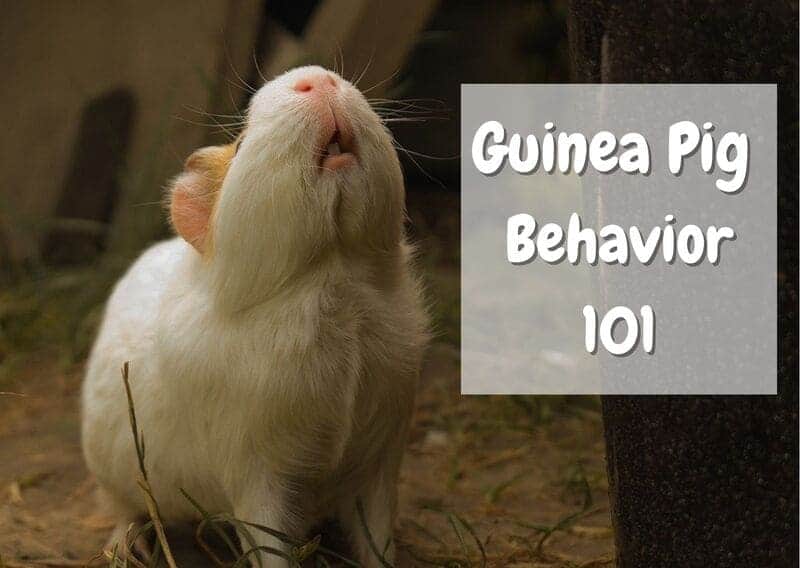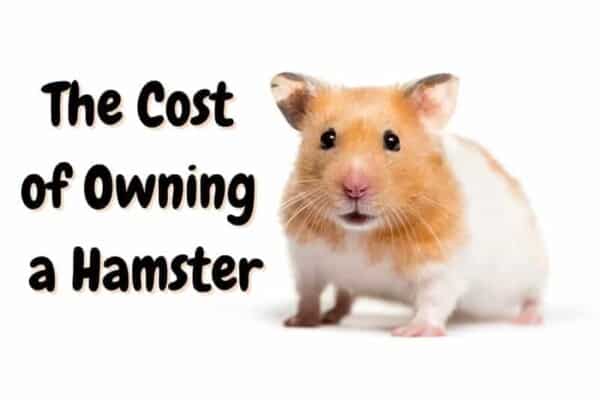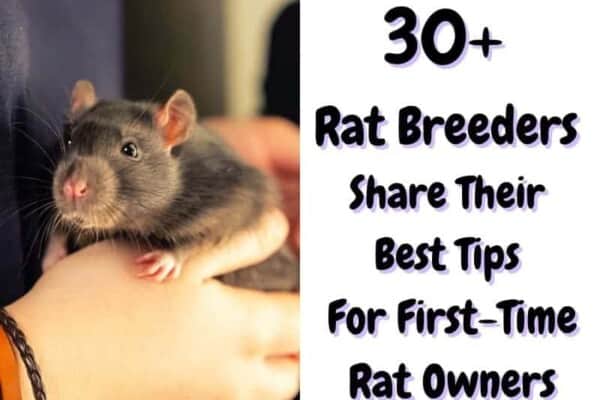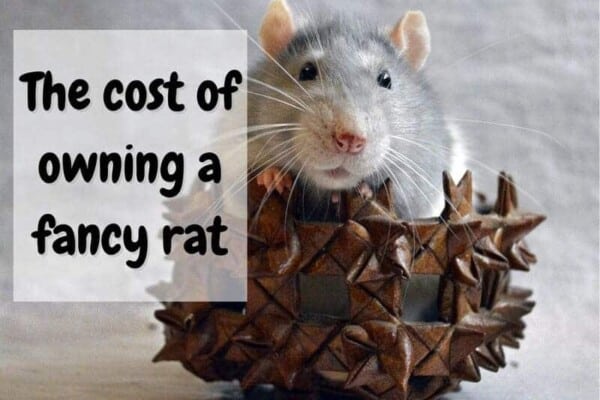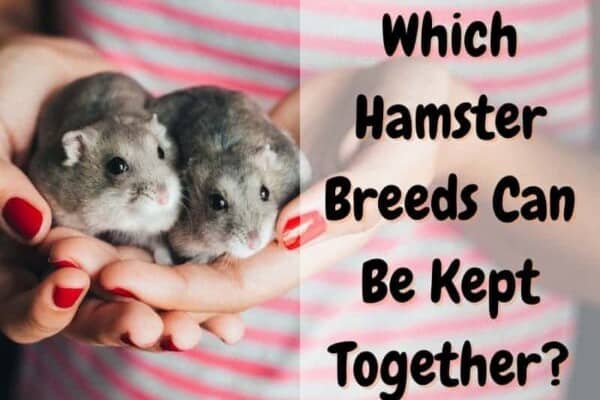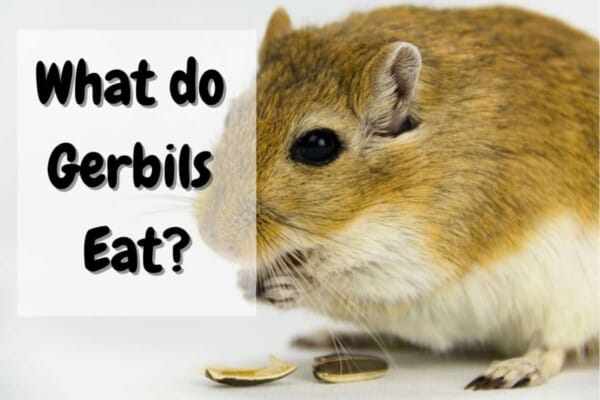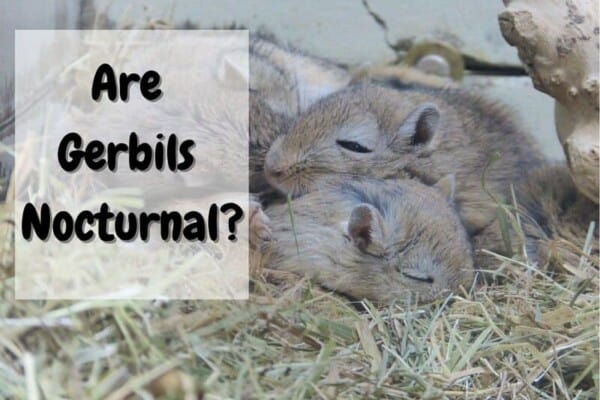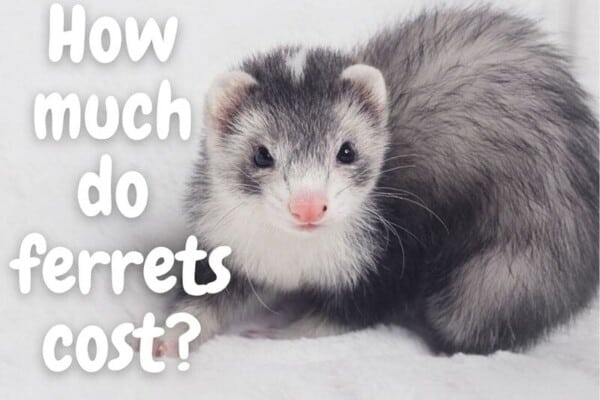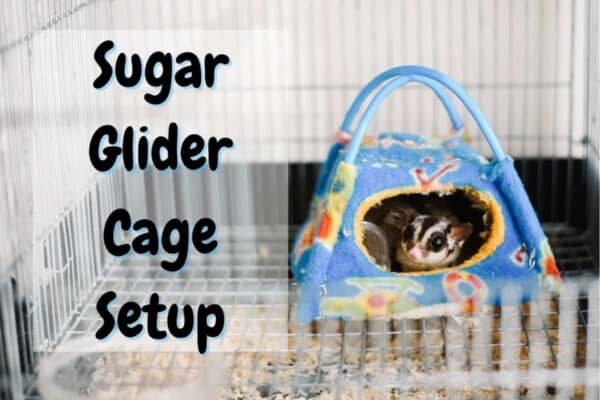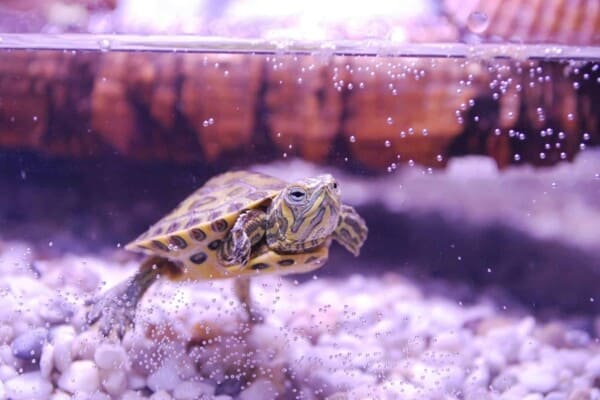Guinea pigs have a pretty wide range of sounds and body movements that tell you what they want. Here is a handy guide to understanding the hidden language of guinea pigs and understanding what they want to tell you or other guinea pigs in the cage.
| Guinea Pig Behavior and Body Language | Guinea Pig Sounds |
|---|---|
| Pop corning | Wheeking |
| Running laps | Chutting |
| Nose touching and sniffing | Rumbling |
| Strutting | Purring |
| Head tossing and nudging | Teeth-chattering |
| Freezing | Chirping |
| Fleeing and stampeding | Whining |
| Squirming | Loud squeak |
Guinea pig behavior and body language
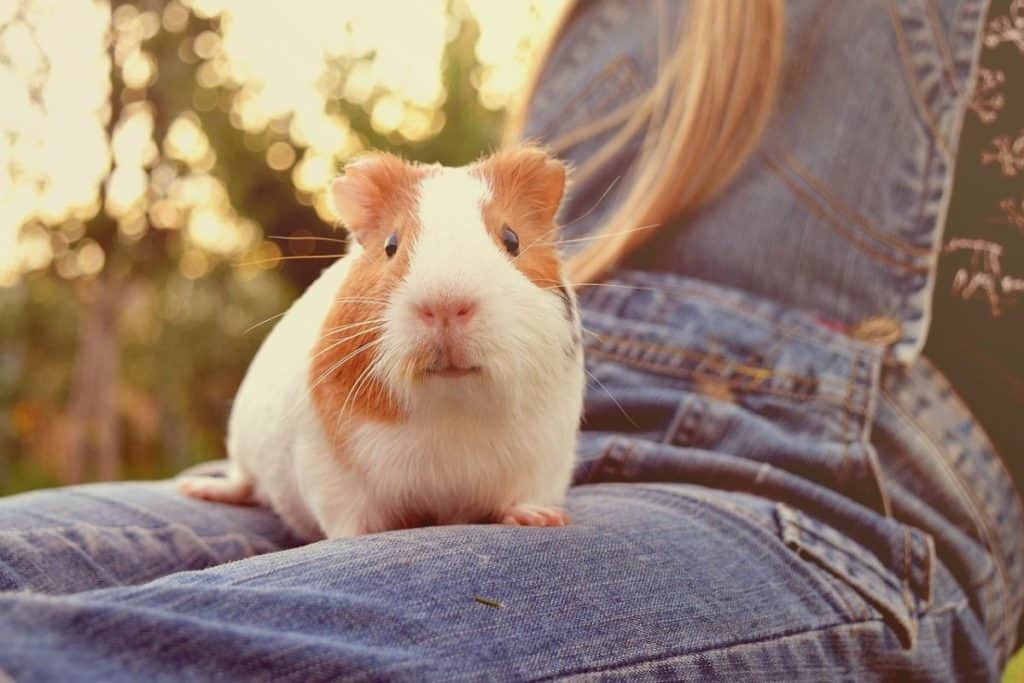
Popcorning
When your guinea pig is especially excited, it will jump into the air. Since their little legs are not very long, this popcorning action is only a couple of inches off the ground. Another species that does this is the chinchilla – they are masters at jumping several feet off the ground.
As you enter the room and your guinea pig is happy to see you, they will start running around and jumping into the air. This is their version of popcorning and is generally a sign that they are hungry and want you to feed them.
Running laps
Running back and forth inside their cage is behavior guinea pigs display when they are excited, which is the reason why a guinea pig cage should be big enough with plenty of space. They can get excited from seeing you come into the room or from the company of others. If they do this in combination with popcorning, then you know this is directed at you.
It can also be from showing a crowd mentality by running with the pack around their cage. They will run from anything that they consider a threat or simply play together.
Nose touching and sniffing
This is part of the guinea pig identification of smelling each other or even smelling you. If they come and smell you, they generally want to know if you have some kind of snack or treat. By touching you with their nose, they are being friendly and not at all aggressive.
They will do this with other guinea pigs so they can identify who is who in their crew. If they are not making any sound at all, this is purely to smell and make contact as a sign of being curious and openly friendly.
Strutting
This is only something that you see when your guinea pig is showing their domination over others in the cage. They use a combination of movements that includes shaking their back end slowly while slowly strutting up to another piggy.
Using a very specific low rumble sound, they will assert their muscle and aggression to show others they mean business. If the other guinea pig backs down, the approaching guinea pig wins the fight.
Head tossing and nudging
This is done to both owners and other guinea pigs and has two different variants involved. The first is using their head to push something out of the way, such as your hand or another guinea pig’s head. They also show another version of this by gently nudging their head into an object.
This can be a sign of friendliness towards you and lets you know that your guinea pig wants attention. When it’s done toward another piggy, this is a motion that tells them to get out of their way.
Freezing
A guinea pig is a very twitchy little animal and any little sound will spook them. If you come into the room and it happens to spook them enough, they will freeze. It does not happen all the time and eases down as they get used to you.
Unfamiliar sounds to them will make them instantly stand completely still until they feel they are not threatened. It can come from a car honking its horn or a dog barking, but all result in the same effect. They will instinctively do this even with a creaking floor since they can be so skittish.
Fleeing and stampeding
They do this when they fear something and run from the perceived trouble. If you own more than a couple of guinea pigs and have a whole family or pack, they will all do the same thing. Stampeding is a group activity that can be funny to watch if you see it in person. Hearing this sound is actually how this action got its name since it sounds like cattle stampeding all at once.
Squirming
Picking up a guinea pig can be a good or bad experience depending on what kind of mood they are in. If they are not being so agreeable on that off day, they will likely try to squirm out of your hand. If you don’t put them down when they start doing this, they will start making other warning noises.
You might even get scratched, bitten, or hear loud shrieks as if they are in pain. The point is that they don’t like being picked up unless they feel like it. If you have something they want, like a treat, they might be more obligated to let you hold them in your hands.
Signs that your guinea pig is fond of you
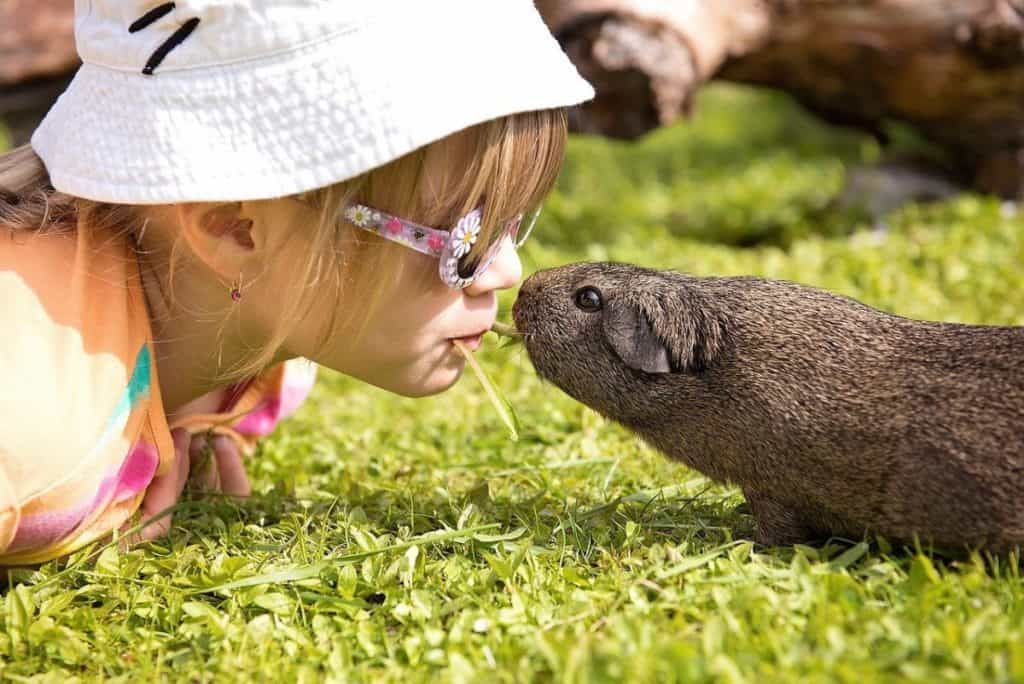
It’s quite common that a guinea pig licks your hand to show that they like you. It can also mean they want to taste your skin. If they are comfortable sleeping in front of you, they certainly trust you, and if they wake up in front of you and are yawning and stretching, they certainly like your presence.
When they talk to you, climb on you, and push your hand around, it means that they are happy being around you. It takes time to get close enough to bond with your guinea pig.
The bonding process that happens between an owner and their pig will have better success with castrated males or neutered females. Without any kind of built-in need for mating, your guinea pig will grow fonder of you as an owner. This will also make them more docile, which will be helpful if you need to groom them.
Courtship behavior between guinea pigs
The action of mating is more than likely the most common part of their courtship. There is no mating ritual dance or attracting of the female at all, it’s straight to business for these guys. Mating can occur for several hours until the male is no longer interested in the female.
Pregnant guinea pig behavior
Pregnancy in female guinea pigs will range from depression-type signs including being lazy and lethargic at times. During pregnancy, they will be weak but still, they will need plenty of nutrients. Since it will be harder for them to move around, if you can move their food and water closer to them, this will greatly help.
Guinea pig stress signs
There are certain signs including nervousness and never laying down when you are around. It can also include poor appetite and doing things like chewing their cage instead. If they are especially nervous, they could take larger bites that are too big to swallow and choke on their food.
Teeth chattering, shaking, and making noises at you, are all tell-tale signs that they are stressed by something. You need to look at them and see if they are suffering from weight loss since this can lead to being prone to sickness.
List of guinea pig sounds
Wheeking
This is an exclusive sound that you only hear from your pig when they want something from you, like food or some attention. Most often they make this sound when they know it’s time to eat.
It’s a sound that is only made towards people, reminding their owners they want their snacks or food to be given. They will continue making this noise until they get what they want. Since they don’t make this noise in the wild, it’s one of the few noises guinea pig noises that is intended just for us.
Chutting
Once your guinea pig has food or is content overall, they begin to make chutting sounds at you. Chutting can be heard when two guinea pigs are communicating with each other as well. Since this sound is used at times when they are most pleased, these sounds can continue for a short period only.
Rumbling
This is only seen with a dominant member of a guinea pig clan that wants to show who is the boss over the entire group. The rumbling part sounds a bit like a hookah pipe bubbling away, while the strutting part is a ritualistic shaking of the hindquarters as they walk. This sound and dance is part of proving who is the most dominant in the group but is linked directly with mating ritual behavior.
Some of the females will also make this sound to boss over other females in their group. Since it has been linked to being dominant, this sound and dance are used to break up a fight. It can also be used as a prelude to starting a fight if there is another guinea pig who acts as a challenger.
Purring
Unlike the sound from a cat, purring from a guinea pig is the exact opposite of content. This means they are annoyed with something and it sounds like low-end whirring.
This sound is the prelude to other defensive sounds that tell you to slowly back off and let them be. After a while, you can approach them again unless they are having a bad day. This sound is also given to other pigs if they are frustrated or annoyed at something they don’t like.
Teeth-chattering
After a purring sound has failed to let you know they are not happy, they give a second warning sound. This is telling you or others that they don’t like something at all and are agitated enough to scrape and click their teeth together. My advice is to not approach them anymore until they lighten up.
Once your guinea pig reaches this point, don’t push your presence around them if they are upset. They get nervous for many reasons and this could erupt into a situation where they get defensive enough to bite.
Chirping
If your guinea pig thinks they are in danger, it will make this audible sound. It’s a noise that sounds the alarm to others that there is some danger nearby. They have been known to do this in the wild, and warn the herd of approaching predators.
In captivity, this perceived danger can be someone knocking on the door, a car backfiring, or even someone sneezing. Their sensitivity is short-lived though and they will go back to grazing and foraging soon enough.
Whining
This sound is a combination of a squeegee window cleaning sound and a chutting sound. This is a warning to other pigs that they don’t want to share food. They only do this with other guinea pigs that are too close for comfort and dislike being crowded.
A guinea pig usually likes complaining about something most of the time if they are not being pampered. If they have all the comforts they need, somehow they will still have time to make complaint sounds.
Loud squeak
This is a very loud pain sound from something that has hurt them or is an immediate threat to being hurt. You won’t hear this sound unless something has caused serious harm to your piggy. The sound you’ll hear is a high-pitched shrill that is alarming enough to get your attention.
They can make this sound if they are picked up suddenly, or if your pet dog strolls into the room unexpectedly. They will make this noise until you find out what is causing so much distress.
Do guinea pigs get lonely?
Guinea pigs do get lonely if they come to being used to your attention. They need a certain amount of personal contact if this is all they have learned. If these are denied from them, they will become stressed and even become sick. Having other buddies in their cage will help diminish the dependence they have on you.
Can you let a guinea pig roam around the house?
If your room is set up to be guinea pig friendly, they can roam around a room. The entire house is not advised since they can get lost very easily. This is not a good thing since they might starve if they get trapped inside a bed or a closet for too many hours. They might also end up escaping outside the house, which can be a problem since guinea pigs can’t stay outside for too long if it’s cold.
What are the symptoms of a dying guinea pig?
There are not too many signs that you will get in advance that your guinea pig is dying. Only after 5 to 8 years is a ticking clock that can go by pretty fast. The most common hints are lack of eating and being active, but it’s hard to differentiate if they are just stressed or nervous.
In the end, if they are not doing too well, make sure you give them as much care to make them comfortable. Give them a separate and calm space to occupy until they have finally passed on.
Related articles:
- How much do guinea pigs cost? A complete cost breakdown
- Are Guinea Pigs nocturnal? Guinea Pig sleep pattern explained
Resources and further reading:
- Social experience, behavior, and stress in guinea pigs, N Sachser, C Lick
- The influence of human interaction on guinea pigs: Behavioral and thermographic changes during animal-assisted therapy, S Wirth, S G Gebhardt-Henrich, S Riemer, J Hattendorf, J Zinsstag, K Hediger

